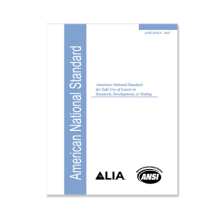The purpose of this standard is to provide guidance on the safe use of lasers and laser systems found in research, development, or testing environments, where safety controls common for commercial lasers may either be missing or disabled. Similarly, in testing environments, lasers or laser systems may be operated in conditions or protocols different from normal operation, including access to levels of radiation higher than the accessible emission limits (AEL) for the assigned product class.
The Z136.8 contains policies and procedures to ensure laser safety in any area where research, development, and testing are performed, including Universities, product development laboratories, private and government research labs (e.g., National Laboratories), and product testing settings.
In this standard, testing includes
- Measurement, evaluation, or assessment of any properties or parameters of the laser radiation emitted by any type of laser, laser system, or laser product in any conditions or operation, maintenance, or service.
- Verification of the functionality of any laser safety features such as protective housing interlocks, interlock override procedures, emission indicators, beam stops or attenuators, remote interlock connections, and operation controls.
- Verification of the overall functionality of any laser, laser system, or laser product to determine if it meets the performance specifications for its intended application.
- Operation of laser products or equipment, where the laser radiation is the “tool” for non-contact tests and measurements.

